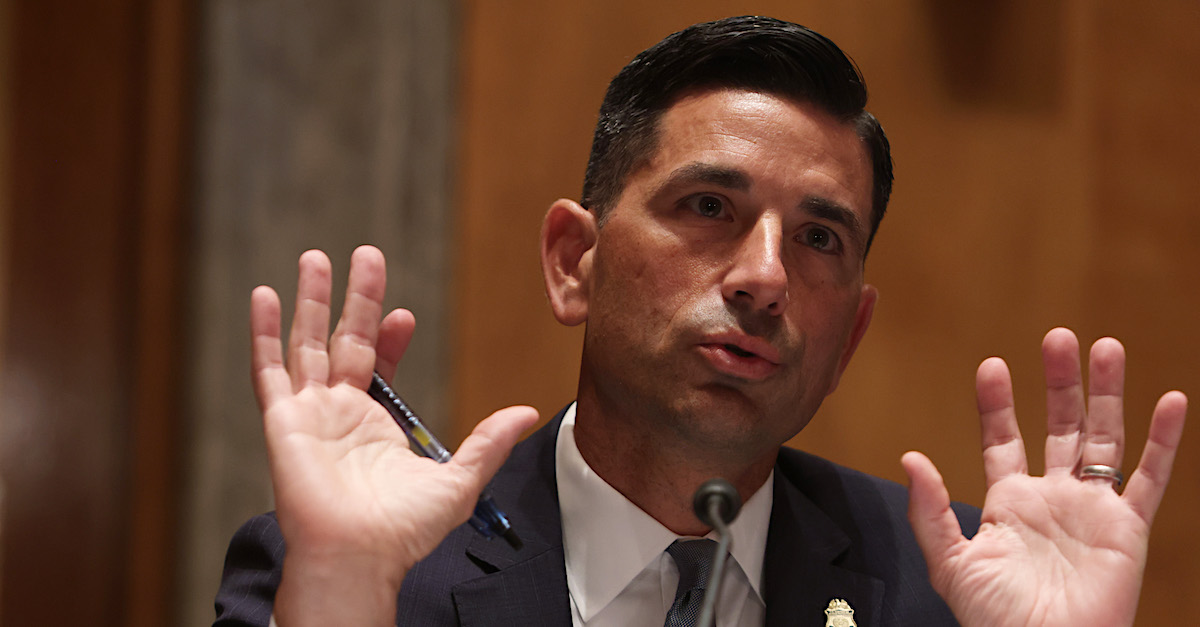
Acting DHS Secretary Chad Wolf
Attorneys at the Department of Homeland Security (DHS) on Friday notified a federal judge that a previous claim relied upon to justify the controversial and likely unlawful appointment of Chad Wolf as Acting Secretary was not true.
Wolf took over the department’s top job after previous Acting Secretary Kevin McAleenan resigned in November 2019, but according to the nonpartisan Government Accountability Office (GAO), Wolf was not the correct official in the line of succession at DHS to assume the role. While Wolf and DHS have vehemently disputed that theory, in a lawsuit filed by several states challenging Wolf’s authority the department recently argued that the point is moot because Wolf was rightfully appointed to the position in September 2020.
The department claimed that after Wolf was officially nominated by President Donald Trump to serve as DHS Secretary on September 10, Peter Gaynor, the head of the Federal Emergency Management Agency (FEMA), became the designated Acting DHS Secretary under the Federal Vacancy Reform Act (FVRA).
According to an Oct. 7 memo submitted by DHS in the Eastern District of New York (EDNY), after Gaynor became Acting Secretary, he exercised his authority to designate a new order of succession under which Wolf, as the Senate-confirmed Under Secretary for Strategy, Policy, and Plans, would have immediately began serving as Acting DHS Secretary.
“Once the Gaynor Order was executed, it superseded any authority Mr. Gaynor may have had under the FVRA and confirmed my authority to continue to serve as the acting secretary,” Wolf wrote in a September 17 memo. “Thus, in addition to the authority I possess pursuant to the November 8, 2019, order of succession effectuated by former Acting Secretary McAleenan, the Gaynor Order alternatively removes any doubt that I am currently serving as the Acting Secretary.”
DHS told the court on Friday, however, that Gaynor may have issued the latest succession order before President Trump officially submitted Wolf ‘s name to the Senate for consideration as DHS Secretary, calling the blunder an “inadvertent factual inaccuracy.”
“Late yesterday evening (Thursday, November 12, 2020), however, the Department of Homeland Security (DHS) conveyed to the Department of Justice that it had learned that Mr. Gaynor’s September 10, 2020 succession order may have been signed approximately one hour before Mr. Wolf’s nomination was formally submitted to the Senate,” said the letter to U.S. District Judge Nicholas G. Garaufis.
“Counsel for Defendants do not yet know the precise timing of events, and Department of Justice counsel are working expeditiously with DHS to verify the exact timing. But it now appears likely, based on the facts known to counsel for Defendants at this time, that Mr. Gaynor’s succession order was signed on September 10, 2020, but before Mr. Wolf’s nomination for the office of Secretary of Homeland Security was submitted to the Senate later that day, which (if true) would be inconsistent with counsel for Defendants’ prior factual understanding, and with the most natural reading of some of the language in Defendants’ reply brief.”
If true, that would mean that Gaynor’s order empowering Wolf was not valid, as Gaynor wasn’t authorized to sign off on a new line of succession at DHS.
Read the DHS letter to judge Garaufis below:
DHS Letter by Law&Crime on Scribd
[image via Alex Wong/Getty Images)